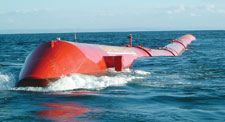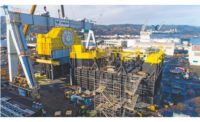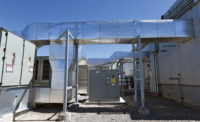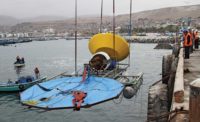 |
| Rolling Seas. Articulated tubes pump hydraulic generators using energy from open-sea waves. |
Assembly has started in Portugal for what will be the world’s first commercial wave-power system under a $10-million contract with a Scottish supplier. If the initial three 750-kW units perform as hoped, the Portuguese utility intends to buy 28 more, says the vendor.
Edinburgh-based Ocean Power Delivery Ltd. early this month shipped out the third unit for assembly at Port of Peniche, north of Lisbon, says business development director Max Carcas. Moored 5 kilometers offshore, the “Pelamis” machines will be owned and operated by a joint venture led by renewables developer Enersis II SGPS S.A., Lisbon.
Resembling a train, the 140-m-long articulated units comprise four 3.5-m-dia main tube sections, which capture wave movements (ENR 4/7/03 p. 17). They are separated by three power-conversion modules. While undulating over waves, the machines power rams, which pump fluid to turn power-generating hydraulic motors. Each machine weighs 350 tonnes, doubling with sand ballast.
All three units should be operational late this summer, says Carcas. A submarine cable will link to the onshore grid. Should Enersis convert its letter of intent to order more units this year into a contract, “we expect [unit] costs to fall quite dramatically,” he adds.
Enersis, which declined to comment, has grown its renewables portfolio from 143 MW in 2002 to about 620 MW of mainly wind power, according to its Australian owner. Sydney-based investment bank Babcock & Brown Ltd. acquired Enersis five months ago for $600 million. Enersis has another 360 MW of renewables due for commissioning over three years, say Babcock officials.
ODP is one of several engineering companies developing wave and tidal energy converters in Scotland. With its long, exposed coastline, Scotland controls 25% of Europe’s tidal resource and 10% of its potential wave energy, according to Scottish Renewables Forum Ltd. (SRF), an Edinburgh-based trade group.
Yet Portugal has beaten the U.K. to commercialize wave power because of its favorable economic regime, according to SRF. Portugal’s enhanced tariff structure to promote marine resources is equivalent to $11 million a year over the Scottish equivalent, asserts SRF. Scotland needs “a clear and unambiguous route to commercialization to encourage further development,” it urges.
(Photo courtesy of Ocean Power Delivery)




Post a comment to this article
Report Abusive Comment